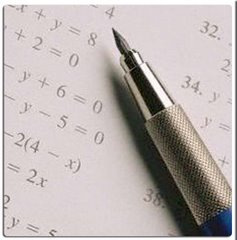The age of B is half the sum of the ages of A and C. If B is 2 years younger than A and C is 32 years
old, then the age of B must be
(A) 28
(B) 30
(C) 32
(D) 34
(E) 36
Sunday, April 29, 2007
Subscribe to:
Post Comments (Atom)
is intended to be a spot where any student preparing for GRE can discuss study topics,find or provide tips & works towards a top score along with other students working for the same goal.Answer"GRE WORD OF THE DAY", "GRE SENTENCE COMPLETION OF THE DAY", "GRE ANALOGY OF THE DAY", "GRE ANTONYM OF THE DAY", "GRE MATH PROBLEM OF THE DAY", "GRE ALGEBRA QUESTION OF THE DAY", "GRE GEOMETRY QUESTION OF THE DAY"& "GRE PASSAGE OF THE WEEK". To get a top score,the first step of the ladder starts from here.

6 comments:
B
D
B
d
D.
a+c = 2b
a-2 = b (-)
________
c+2= b (c=32)
so b = 32+2 = 34
Let a represent the age of A and let c represent the age of C. If b represents the age of B, then
according to the question b = [a + c]/2
. We are told that B is 2 years younger than A. This generates the
equation a = b + 2. We know that the age of C is 32. Substituting these values into the equation b =
[a + c]/2
yields b =
[(b + 2) + 32]/2
. Solving this equation for b yields b = 34. The answer is (D).
Post a Comment